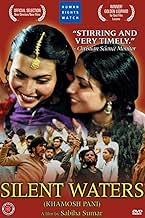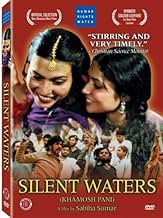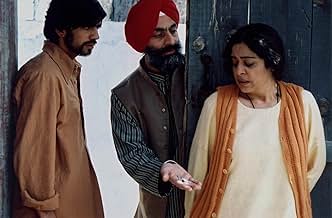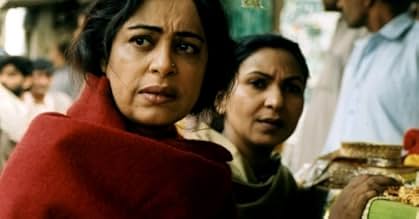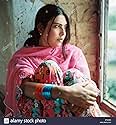IMDb RATING
7.5/10
1.3K
YOUR RATING
1979. A village in Pakistan. A widow sees her 17 years old son being attracted to Islamist militants. It brings her past back.1979. A village in Pakistan. A widow sees her 17 years old son being attracted to Islamist militants. It brings her past back.1979. A village in Pakistan. A widow sees her 17 years old son being attracted to Islamist militants. It brings her past back.
- Director
- Writers
- Stars
- Awards
- 8 wins & 2 nominations total
Aamir Ali Malik
- Saleem
- (as Aamir Malik)
Navtej Singh Johar
- Jaswant
- (as Navtej Johar)
Arshad Mahmood
- Mehboob
- (as Arsad Mahmud)
Fareeha Jabeen
- Shabnam
- (as Fariha Jabeen)
- Director
- Writers
- All cast & crew
- Production, box office & more at IMDbPro
Featured reviews
I am at a loss of words after watching this one which is more than a film, it is an experience therefore, the only words in which this masterpiece can be described are adjectives-mind blowing, shocking, great in narrative and style, simple and subtle, poignant, brilliant exposition. Here is finally a movie, that shocks you, surprises you, questions you, slaps you, make you cry, shows you a mirror-to sum up evoke strong responses. The film finally succeeds in speaking a universal language. Here No sides are taken but just roots you to the middle of the premise. It touched the epic proportions of earlier masterpieces Garam Hawa and Tamas, based on partition issues. Though an influence of Iranian new wave cinema is seen on film maker sabiha sumer yet it is an original piece. A superior product, a touching tale, a classic world cinema, indeed.. "Jinhe naaz hai Black par wo kahan hain".
Its easier to stand on the present day and judge the event on the basis of right and wrong (of course staying within the limits of being politically correct). Khamosh Paani does a bit more than that. It goes back in time and attempts to point at the situations/ circumstances/ events where the seeds of terrorism & fundamentalism were sown by wily politicians in the garb of uniting the people to cleanse the nation. Khamosh Paani is an introspection and references to the Godzilla staring at everyones face today. Through the character of Veero/ Ayesha the director attempts to give a message that history is bound to repeat itself when the path of extremism is chosen.
Kiron Kher: Veero/ Ayesha has seen it before and its almost like a a deja vu should her son chooses to tread the path. The pain and anguish of the mother, yet being resilient to hold back the truth is well portrayed.
Aamir Ali Malik: He does a good job of donning various caps from a headless "lover-boy" chicken, metamorphosing into a purpose-filled jihaadi youth.
Shilpa Shukla: It took me a while to recollect this "Chak De" girl. Her character was merely "used" to show the ideology change in Saleem owing to which the there isn't much meat.
The built up of the events and narrative deserves brownie points. The prosake village life where everybody is living harmoniously like a family is depicted well and the initiation of the snail-paced transformation.
Sabiha Sumar has a story to tell and it does come with a bitter pill, therefore the viewpoint is open to debate. And the barrage of pot calling the kettle black starts - NOW!
Kiron Kher: Veero/ Ayesha has seen it before and its almost like a a deja vu should her son chooses to tread the path. The pain and anguish of the mother, yet being resilient to hold back the truth is well portrayed.
Aamir Ali Malik: He does a good job of donning various caps from a headless "lover-boy" chicken, metamorphosing into a purpose-filled jihaadi youth.
Shilpa Shukla: It took me a while to recollect this "Chak De" girl. Her character was merely "used" to show the ideology change in Saleem owing to which the there isn't much meat.
The built up of the events and narrative deserves brownie points. The prosake village life where everybody is living harmoniously like a family is depicted well and the initiation of the snail-paced transformation.
Sabiha Sumar has a story to tell and it does come with a bitter pill, therefore the viewpoint is open to debate. And the barrage of pot calling the kettle black starts - NOW!
Nothing prepares you for the subtlety and searing honesty of this film. There is something ennobling about watching it. The director gives us vignettes of life in Pakistan, circa 1980 and 1999, and paints the portrait of a country in the grip of a ruinous Islamization. General Zia-ul-Haq took the country backward by several years through his repressive policies and Sabiha Sumar shows us glimpse of what he did to the country.
In a film so subtly wrought, it is unusual to be struck particularly by acting performances but for Shilpa Shukla is a revelation. It is a splendidly understated performance and I must say her sensuality stirred me too.
In a film so subtly wrought, it is unusual to be struck particularly by acting performances but for Shilpa Shukla is a revelation. It is a splendidly understated performance and I must say her sensuality stirred me too.
There is a side to Pakistan most of us are blind to. At least visually.
Director Sabiha Sumar presents that side to us -- a desolate, barren Pakistan, a magnificent, sprawling wasteland worthy of a Sergio Leone classic. For someone used to the congested streets of an Indian metropolis, seeing this grand, hilly Pakistani village, full of whispered secrets and echoed threats holds a surreal poignancy.
In the Charkhi village of Punjab in Pakistan, life is quirky, quaint, and increasingly foreboding. The setting itself presents a paradox: there are fortresses available for youngsters to romantically rendezvous, but no place for a kafir (non-Muslim) to hide.
Khamosh Pani revolves around the life of a simple, middle-aged woman, Ayesha, played by Kirron Kher. She seems normal enough, a typical Pakistani lady, living the placid life of a widow, supporting her family by giving Quran lessons to neighbourhood children. As the film builds slowly into its plot, we begin to suspect the central protagonist is actually her wistful son, Saleem.
Saleem, played by Aamir Malik, looks exactly in the Jimmy Mistry (The Guru, East Is East) mold, just floppier, lazy, and intensely likable. With a boyish grin firmly in place, he is smitten with girl-next-door, the no-nonsense Zubeida, who's trying to goad him into getting a job.
As the two murmur besotted secrets to each other across the roofs of conveniently empty minarets, Saleem realises that Zubeidaa's dreams of going to college and fashioning her career and her own riches far outweigh his own. In fact, he doesn't have any dream at all, just shuffling through life listlessly. He needs a vocation, a higher cause to believe in.
At this crucial juncture in his youth, Charkhi's naïveté is shattered by the arrival of Islamic fundamentalists. We suddenly realize that the year is 1979, and we're told emotionally that Prime Minister Zulfikar Ali Bhutto has just been hanged.
There is ample scope for over-dramatisation, but the scene has been handled with wonderful restraint -- a postman stands by his bicycle, seemingly lost. When Ayesha repeatedly asks him what's wrong, he just shakes his head and shows her the paper, muttering in disbelief that the prime minister has been hanged. Immediately, we're framed into uncannily familiar perspective:
General Zia's period of marshal law has begun.
As the Sikhs are allowed to cross the border and revisit their native places of worship, dissent and fundamentalism sets in deeper. Saleem is now one of them, a misguided boy strongly hanging on to a deluded version of Allah.
The film turns darker and more sombre as an important issue comes evocatively to the fore. A gentle visiting Sikh alludes to the prospect of some female relatives being left behind during Partition, but is silenced vehemently by those around him. It is an issue of pride, and we are awakened to the nightmare that families actually killed their own, sacrificing them brutally to avoid dishonor at the hands of the enemy.
The irony is painfully simple: the womanfolk were actually safer in the hands of the very enemy, whose attempt at dishonor was probably preferable to the slaughter their own families put them through.
Zubair (Navtej Johar), however, is a Sikh determined to find his long-lost elder sister, and is sure she lived around these parts. The film is based on true incidents of the time, and as we shuttle through flashback and the present, Khamosh Pani confronts us with information many of us are unaware of.
The film is subtle, and refreshingly free of hysteria, enough to make it one of the best films in the increasingly crowded Partition genre, and reminds us that the subject still has so much to explore. It's a film striking in its simplicity, unlike most recent attempts that usually peter off into melodrama or pander to clichés and even propaganda.
Most directors, with an eye on the festival circuit, try to exaggerate their viewpoints, and show off cinematic abilities. Mira Nair is a case in point. Here, the debutante filmmaker has made a commendable first effort, with visible sincerity. Her lead actress, Kher, has done an overwhelming job, underplayed but truly a wonderfully written role.
This is the first Pakistani film I've ever watched; Sabiha Sumar has made sure it won't be the last.
Director Sabiha Sumar presents that side to us -- a desolate, barren Pakistan, a magnificent, sprawling wasteland worthy of a Sergio Leone classic. For someone used to the congested streets of an Indian metropolis, seeing this grand, hilly Pakistani village, full of whispered secrets and echoed threats holds a surreal poignancy.
In the Charkhi village of Punjab in Pakistan, life is quirky, quaint, and increasingly foreboding. The setting itself presents a paradox: there are fortresses available for youngsters to romantically rendezvous, but no place for a kafir (non-Muslim) to hide.
Khamosh Pani revolves around the life of a simple, middle-aged woman, Ayesha, played by Kirron Kher. She seems normal enough, a typical Pakistani lady, living the placid life of a widow, supporting her family by giving Quran lessons to neighbourhood children. As the film builds slowly into its plot, we begin to suspect the central protagonist is actually her wistful son, Saleem.
Saleem, played by Aamir Malik, looks exactly in the Jimmy Mistry (The Guru, East Is East) mold, just floppier, lazy, and intensely likable. With a boyish grin firmly in place, he is smitten with girl-next-door, the no-nonsense Zubeida, who's trying to goad him into getting a job.
As the two murmur besotted secrets to each other across the roofs of conveniently empty minarets, Saleem realises that Zubeidaa's dreams of going to college and fashioning her career and her own riches far outweigh his own. In fact, he doesn't have any dream at all, just shuffling through life listlessly. He needs a vocation, a higher cause to believe in.
At this crucial juncture in his youth, Charkhi's naïveté is shattered by the arrival of Islamic fundamentalists. We suddenly realize that the year is 1979, and we're told emotionally that Prime Minister Zulfikar Ali Bhutto has just been hanged.
There is ample scope for over-dramatisation, but the scene has been handled with wonderful restraint -- a postman stands by his bicycle, seemingly lost. When Ayesha repeatedly asks him what's wrong, he just shakes his head and shows her the paper, muttering in disbelief that the prime minister has been hanged. Immediately, we're framed into uncannily familiar perspective:
General Zia's period of marshal law has begun.
As the Sikhs are allowed to cross the border and revisit their native places of worship, dissent and fundamentalism sets in deeper. Saleem is now one of them, a misguided boy strongly hanging on to a deluded version of Allah.
The film turns darker and more sombre as an important issue comes evocatively to the fore. A gentle visiting Sikh alludes to the prospect of some female relatives being left behind during Partition, but is silenced vehemently by those around him. It is an issue of pride, and we are awakened to the nightmare that families actually killed their own, sacrificing them brutally to avoid dishonor at the hands of the enemy.
The irony is painfully simple: the womanfolk were actually safer in the hands of the very enemy, whose attempt at dishonor was probably preferable to the slaughter their own families put them through.
Zubair (Navtej Johar), however, is a Sikh determined to find his long-lost elder sister, and is sure she lived around these parts. The film is based on true incidents of the time, and as we shuttle through flashback and the present, Khamosh Pani confronts us with information many of us are unaware of.
The film is subtle, and refreshingly free of hysteria, enough to make it one of the best films in the increasingly crowded Partition genre, and reminds us that the subject still has so much to explore. It's a film striking in its simplicity, unlike most recent attempts that usually peter off into melodrama or pander to clichés and even propaganda.
Most directors, with an eye on the festival circuit, try to exaggerate their viewpoints, and show off cinematic abilities. Mira Nair is a case in point. Here, the debutante filmmaker has made a commendable first effort, with visible sincerity. Her lead actress, Kher, has done an overwhelming job, underplayed but truly a wonderfully written role.
This is the first Pakistani film I've ever watched; Sabiha Sumar has made sure it won't be the last.
Khamosh Pani will go down in Pakistani history as the most important work of art and politic since the country's inception. The story documents the era (1979) of the CIA-assisted killing of the democratically elected prime minister Bhutto and the installation of fundamentalist dictator General Zia ul-Haq. The film chronicles the death of love and the birth of hate as part of a continuing cycle of violence that has besieged that part of the world. Religious intolerance, bigotry and ignorance are the fierce villains of the movie. The film has managed to humanize the tragedy of the Pakistani people's struggle with fanaticism and imported agendas. What I particularly love about this film, besides the fact that it is technically remarkable, is the fact that it does not glorify death or killing. This is not a Bollywood or Lollywood melodrama. Beautiful punjabi language script adds to the authenticity of this true-to-life cinema representation of the people of the land. This film is brave to acknowledge the atrocities of displacement; of the violence against Sikhs and against women that was part of the partition of India and Pakistan. Well acted, well written and extremely well directed. Bravo!
Did you know
- TriviaIndian distributor Shringar Films initially intended to dub the film in Hindi for local release, but eventually decided to release it with its original Punjabi audio with English subtitles.
- ConnectionsFeatured in Women Make Film: A New Road Movie Through Cinema (2018)
Details
- Release date
- Countries of origin
- Official sites
- Languages
- Also known as
- Eaux silencieuses
- Filming locations
- Production companies
- See more company credits at IMDbPro
Box office
- Gross US & Canada
- $7,384
- Opening weekend US & Canada
- $1,617
- Oct 10, 2004
- Gross worldwide
- $7,384
Contribute to this page
Suggest an edit or add missing content




